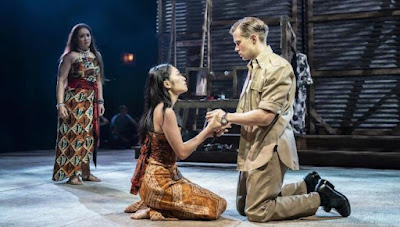On the 7th January 1536, Catherine of Aragon was 50, Anne Boleyn was 32ish, Jane Seymour was about 28, Anne of Cleves was 21, Catherine Howard was 13ish and Catherine Parr was 33. It was the last day these six women were all alive at the same time as Catherine of Aragon died later that day... that is until 481 years later when they came together to form a girl group... and the rest is history!
I had no interest in seeing Toby Marlow and Lucy Moss' musical SIX - it sounded like the archetypal Edinburgh fringe show grown beyond all recognition, the unrelenting marketing campaign, the ersatz empowerment of the post-WICKED audience, as well as the sheer banality of the concept. So I had no expectations when I took my seat in the Vaudeville Theatre, surrounded by an audience who bubbled with a febrile excitement, the last time that happened was when I saw HAMILTON with an audience who seemed to know the score and the book backwards and nearly clapped the ushers.
Constant Reader... I loved it.
I sat up as soon as the show started with it's ominous drums punctuating the intoned "Divorced, Beheaded, Died... Divorced, Beheaded, Survived" and by the time the Queens had introduced themselves with the anthemic "Ex-Wives" I was onboard. Toby Marlow and Lucy Moss' exhilarating and witty score takes in girl group anthems, r&b sass, girl pop, Adele-style ballads, Euro House bangers, Scandi-pop and Alicia Keys-style swoony ballads and they all come together to give us an exciting MegaSix where they all are reprised in a blaze of light. They totally deserved their Tony Award for Best Score.
Lucy Moss co-directed the show with Jamie Armitage and the show is gripping from start to finish. Although this is now the second cast after the show's post-COVID opening, they all play with a ferocious commitment. The show demands much of the cast as they not only sing their own solos but provide backing vocals for the others, so they have four alternatives ready to jump in to any of the roles - indeed we saw an alternate Anne of Cleves but she fitted seamlessly with the cast.
.png)
The Queens decide on a competition to find the lead singer based on who suffered the most: Amy Di Bartolomeo was an imperious Catherine of Aragon relishing her
position as the longest surviving wife, Amanda Lindgren was a
deliciously vixenish Anne Boleyn, Claudia Kariuki stopped the show with
her Adele-ish "Heart of Stone" as Jane Seymour shows her love was
unbreakable, Esme Rothero was a delighful Anna of Cleves, relishing her
freedom as a divorcée, and Tsemaye Bob-Egbe made a heartbreaking
Catherine Howard slowly revealing a damaged young girl who was sexually
used by the men who surrounded her from her early teens.
The show turns on this solo and the real issue of Marlow and Moss' show is revealed when Meesha Turner's Catherine Parr refuses to take part in the game. revealing that she left her real love to marry the King. It is Parr who makes the Queens realise that their individual lives have been reduced into mere anecdotes in the life of a Great Historical Man. It all reminded me of Hallie Rubenhold's THE FIVE where she brought the victims of Jack The Ripper into the light, no longer just a pile of bodies. It might read as obvious MeToo enpowerment but within the show it is a powerful moment.

The production team have all added to the show's success: the marvellous four onstage musicians blast the music over the footlights, Carrie-Anne Ingrouille's energetic choreography delivers, Emma Bailey's set design focuses the action, Gabriella Slade's Tony Award-winning costumes are witty and delightful, Tim Deiling's lighting is remarkable and the Vaudeville's rafters are shaken by Paul Gatehouse's powerful sound design. How the show lost every Olivier nomination is beyond me - SIX lost to the dull COME FROM AWAY?? Queen, please!
Marlow and Moss have written a show that can be played by a non-binery cast which would be very interesting to see, they are talents worth watching. It is 50 years since my life was changed by Richard Eyre's GUYS AND DOLLS at the National Theatre; looking around at the excited, shining faces of the young audience leaving SIX I can only hope that the spark of the transformative alchemy that happens when seeing a great theatre production had been passed on...
...you just need the right production.





















.png)
















.jpg)










